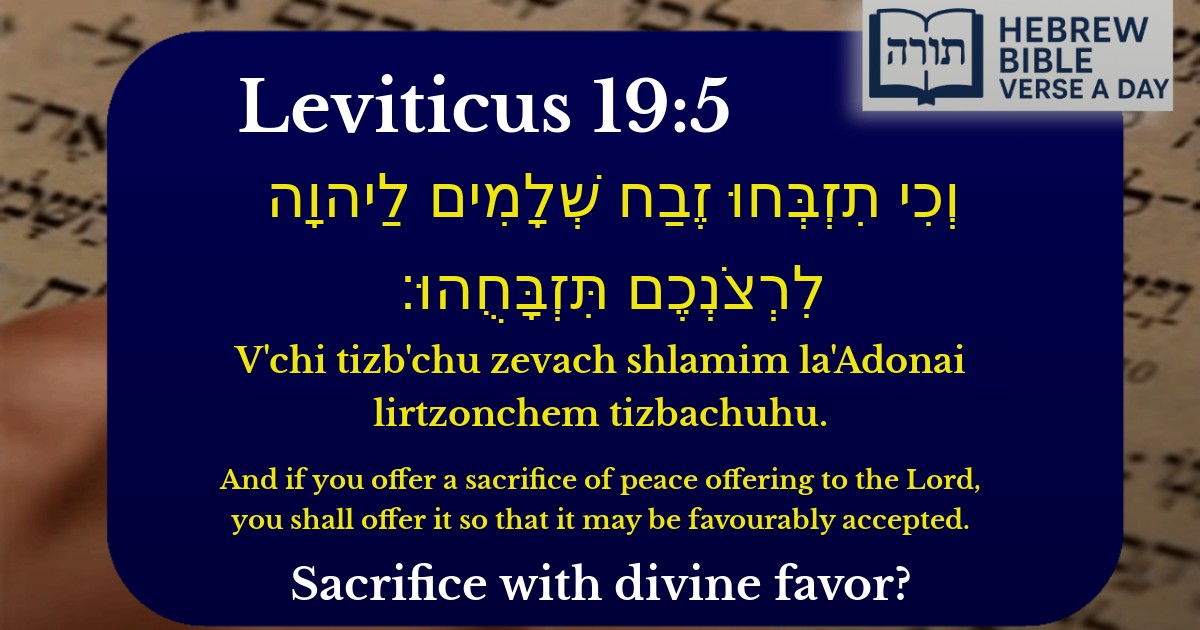Join Our Newsletter To Be Informed When New Videos Are Posted
Join the thousands of fellow Studends who rely on our videos to learn how to read the bible in Hebrew for free!
Hebrew Text
וְכִי תִזְבְּחוּ זֶבַח שְׁלָמִים לַיהוָה לִרְצֹנְכֶם תִּזְבָּחֻהוּ׃
English Translation
And if you offer a sacrifice of peace offering to the Lord, you shall offer it so that it may be favourably accepted.
Transliteration
V'chi tizb'chu zevach shlamim la'Adonai lirtzonchem tizbachuhu.
Hebrew Leining Text
וְכִ֧י תִזְבְּח֛וּ זֶ֥בַח שְׁלָמִ֖ים לַיהֹוָ֑ה לִֽרְצֹנְכֶ֖ם תִּזְבָּחֻֽהוּ׃
וְכִ֧י תִזְבְּח֛וּ זֶ֥בַח שְׁלָמִ֖ים לַיהֹוָ֑ה לִֽרְצֹנְכֶ֖ם תִּזְבָּחֻֽהוּ׃
🎵 Listen to leining
Parasha Commentary
📚 Talmud Citations
This verse is quoted in the Talmud.
📖 Menachot 110a
The verse is discussed in the context of the laws regarding sacrifices, particularly peace offerings, and how they should be offered to be favorably accepted by the Lord.
📖 Zevachim 2a
The verse is referenced in discussions about the proper intentions and methods for offering sacrifices, emphasizing the requirement for them to be offered willingly and correctly.


Context of the Verse
The verse (Vayikra 19:5) discusses the laws of the zevach shelamim (peace offering), one of the voluntary sacrifices brought in the Beit HaMikdash. Unlike obligatory offerings, the shelamim expresses gratitude, fulfillment of a vow, or freewill devotion to Hashem. The phrase "לִרְצֹנְכֶם" ("so that it may be favorably accepted") emphasizes the proper intentions required in sacrificial service.
Rashi's Explanation
Rashi (Vayikra 19:5) interprets "לִרְצֹנְכֶם" to mean that the sacrifice must be slaughtered lishmah (for its proper purpose)—specifically for a shelamim offering. If slaughtered with improper intent (e.g., as a different type of sacrifice), it becomes pigul (invalid). This teaches that proper kavanah (intention) is essential in avodat Hashem (divine service).
Rambam's Perspective
In Hilchot Ma'aseh HaKorbanot (4:6), the Rambam elaborates that the verse underscores the requirement for sincerity in bringing offerings. The term "לִרְצֹנְכֶם" implies that the sacrifice must align with the donor’s pure desire to draw closer to Hashem, not as a mere ritual. The Rambam further emphasizes that sacrifices without proper devotion are spiritually deficient.
Midrashic Insight
The Sifra (Kedoshim 4:5) links this verse to the broader theme of kedushah (holiness). It teaches that offerings must reflect inner sanctity—aligning one’s actions with divine will. The Midrash adds that "לִרְצֹנְכֶם" hints at the joy and voluntariness inherent in serving Hashem, as the shelamim was often shared in festive meals, symbolizing peace between the individual, Hashem, and the community.
Halachic Implications
Philosophical Lesson
The Kli Yakar (Vayikra 19:5) explains that the term "לִרְצֹנְכֶם" alludes to the harmony (shalom) between one’s physical actions and spiritual intentions. True service of Hashem requires unity of body and soul—where the external act of sacrifice mirrors internal devotion. This ideal extends beyond the Beit HaMikdash, guiding all mitzvot to be performed with wholehearted commitment.